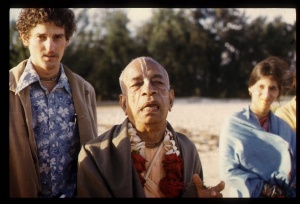SB 1.4.6: Difference between revisions
m (1 revision(s)) |
No edit summary |
||
| Line 1: | Line 1: | ||
{{info | {{info | ||
|speaker= | |speaker=Śaunaka Ṛṣi | ||
|listener= | |listener=Sūta Gosvāmī and the Sages | ||
}} | }} | ||
[[Category:Srimad-Bhagavatam - Canto 01 Chapter 04|S06]] | |||
[[Category:Bhagavatam Verses Spoken by Saunaka Rsi - Vanisource|010406]] | |||
<div style="float:left">'''[[Srimad-Bhagavatam]] - [[SB 1|First Canto]] - [[SB 1.4: The Appearance of Sri Narada|Chapter 4: The Appearance of Śrī Nārada]]'''</div> | |||
<div style="float:right">[[File:Go-previous.png|link=SB 1.4.5]] '''[[SB 1.4.5]] - [[SB 1.4.7]]''' [[File:Go-next.png|link=SB 1.4.7]]</div> | |||
{{CompareVersions|SB|1.4.6|SB 1962|SB 1972-77}} | |||
{{RandomImage}} | |||
==== TEXT 6 ==== | ==== TEXT 6 ==== | ||
<div | <div class="verse"> | ||
katham ālakṣitaḥ pauraiḥ | :katham ālakṣitaḥ pauraiḥ | ||
samprāptaḥ kuru-jāṅgalān | :samprāptaḥ kuru-jāṅgalān | ||
unmatta-mūka-jaḍavad | :unmatta-mūka-jaḍavad | ||
vicaran gaja-sāhvaye | :vicaran gaja-sāhvaye | ||
</div> | </div> | ||
| Line 17: | Line 23: | ||
==== SYNONYMS ==== | ==== SYNONYMS ==== | ||
<div | <div class="synonyms"> | ||
''katham''—how; ''ālakṣitaḥ''—recognized; ''pauraiḥ''—by the citizens; ''samprāptaḥ''—reaching; ''kuru-jāṅgalān''—the Kuru-jāṅgala provinces; ''unmatta''—mad; ''mūka''—dumb; ''jaḍavat''—stunted; ''vicaran''—wandering; ''gaja-sāhvaye''—Hastināpura. | |||
</div> | </div> | ||
| Line 24: | Line 30: | ||
==== TRANSLATION ==== | ==== TRANSLATION ==== | ||
<div | <div class="translation"> | ||
How was he [Śrīla Śukadeva, the son of Vyāsa] recognized by the citizens when he entered the city of Hastināpura [now Delhi], after wandering in the provinces of Kuru and Jāṅgala, appearing like a madman, dumb and retarded? | How was he [Śrīla Śukadeva, the son of Vyāsa] recognized by the citizens when he entered the city of Hastināpura [now Delhi], after wandering in the provinces of Kuru and Jāṅgala, appearing like a madman, dumb and retarded? | ||
</div> | </div> | ||
| Line 31: | Line 37: | ||
==== PURPORT ==== | ==== PURPORT ==== | ||
<div | <div class="purport"> | ||
The present city of Delhi was formerly known as Hastināpura because it was first established by King Hastī. Gosvāmī Śukadeva, after leaving his paternal home, was roaming like a madman, and therefore it was very difficult for the citizens to recognize him in his exalted position. A sage is not, therefore, recognized by sight, but by hearing. One should approach a sādhu or great sage not to see but to hear him. If one is not prepared to hear the words of a sādhu, there is no profit. Śukadeva Gosvāmī was a sādhu who could speak on the transcendental activities of the Lord. He did not satisfy the whims of ordinary citizens. He was recognized when he spoke on the subject of Bhāgavatam, and he never attempted jugglery like a magician. Outwardly he appeared to be a retarded, dumb madman, but in fact he was the most elevated transcendental personality. | The present city of Delhi was formerly known as Hastināpura because it was first established by King Hastī. Gosvāmī Śukadeva, after leaving his paternal home, was roaming like a madman, and therefore it was very difficult for the citizens to recognize him in his exalted position. A sage is not, therefore, recognized by sight, but by hearing. One should approach a ''sādhu'' or great sage not to see but to hear him. If one is not prepared to hear the words of a ''sādhu'', there is no profit. Śukadeva Gosvāmī was a ''sādhu'' who could speak on the transcendental activities of the Lord. He did not satisfy the whims of ordinary citizens. He was recognized when he spoke on the subject of ''Bhāgavatam'', and he never attempted jugglery like a magician. Outwardly he appeared to be a retarded, dumb madman, but in fact he was the most elevated transcendental personality. | ||
</div> | </div> | ||
__NOTOC__ | |||
<div style="float:right; clear:both;">[[File:Go-previous.png|link=SB 1.4.5]] '''[[SB 1.4.5]] - [[SB 1.4.7]]''' [[File:Go-next.png|link=SB 1.4.7]]</div> | |||
__NOTOC__ | |||
__NOEDITSECTION__ | |||
Revision as of 14:45, 29 April 2021

A.C. Bhaktivedanta Swami Prabhupada
TEXT 6
- katham ālakṣitaḥ pauraiḥ
- samprāptaḥ kuru-jāṅgalān
- unmatta-mūka-jaḍavad
- vicaran gaja-sāhvaye
SYNONYMS
katham—how; ālakṣitaḥ—recognized; pauraiḥ—by the citizens; samprāptaḥ—reaching; kuru-jāṅgalān—the Kuru-jāṅgala provinces; unmatta—mad; mūka—dumb; jaḍavat—stunted; vicaran—wandering; gaja-sāhvaye—Hastināpura.
TRANSLATION
How was he [Śrīla Śukadeva, the son of Vyāsa] recognized by the citizens when he entered the city of Hastināpura [now Delhi], after wandering in the provinces of Kuru and Jāṅgala, appearing like a madman, dumb and retarded?
PURPORT
The present city of Delhi was formerly known as Hastināpura because it was first established by King Hastī. Gosvāmī Śukadeva, after leaving his paternal home, was roaming like a madman, and therefore it was very difficult for the citizens to recognize him in his exalted position. A sage is not, therefore, recognized by sight, but by hearing. One should approach a sādhu or great sage not to see but to hear him. If one is not prepared to hear the words of a sādhu, there is no profit. Śukadeva Gosvāmī was a sādhu who could speak on the transcendental activities of the Lord. He did not satisfy the whims of ordinary citizens. He was recognized when he spoke on the subject of Bhāgavatam, and he never attempted jugglery like a magician. Outwardly he appeared to be a retarded, dumb madman, but in fact he was the most elevated transcendental personality.